EDIT NIKOLLI
The Ministry of Education has not released any data on the effectiveness of blended learning since the start of the 2020-2021 school year. The most recent official publication is based on a survey conducted in August 2020, which found that about 42% of the respondents were against blended learning. Students, parents, and teachers who told Faktoje that blended learning was ineffective filled out a survey in January 2021, but the MoESY has yet to release the findings. According to the World Bank report, remote learning exacerbates the learning standard, which was already worrying in the Balkans in general, and Albania in particular, before the pandemic.
COVID-19 first appeared in our country a year ago, and it seems that the education system is one of the most impacted sectors.
During this time, since switching to distance education, Faktoje published many articles on education and learning.
We sent the Ministry of Education a request for information on the findings and results of stakeholder surveys on the efficiency of online education and blended learning.
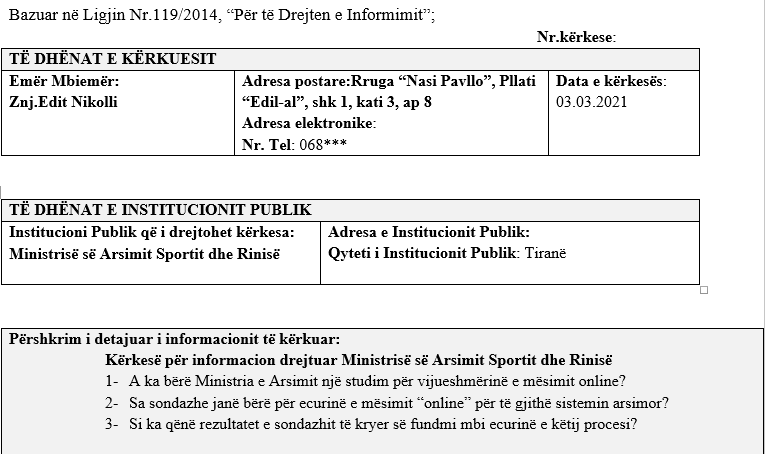
Request for information to MoESY, March 3, 2020
The Ministry of Education issued the following reply following Faktoje’s persistence in receiving the requested information.
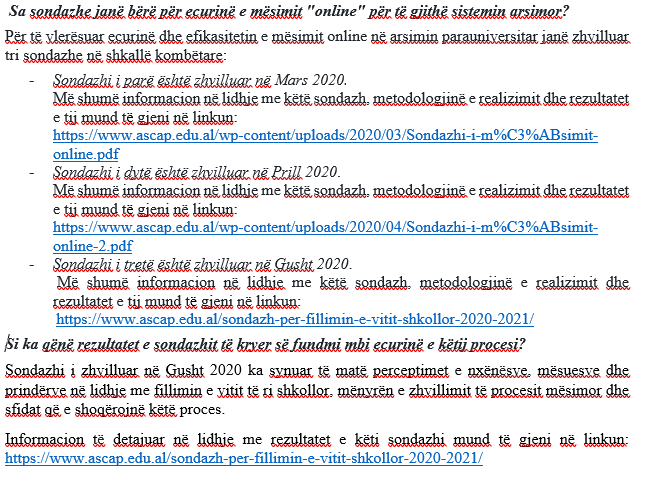
Reply of the Ministry of Education, March 24, 2021
We checked out MoESY’s first survey, which was completed in March 2020. The survey included 178,096 students, 118,376 parents, and 25,439 teachers, for a total of 321,911 respondents in 61 municipalities. The survey did not include pre-school or vocational education, according to MoESY.
According to MoESY, online education was used by 96.8% of students, 95.3 percent of parents, and 98.7% of teachers.
“About 86.4 percent of students agreed or strongly agreed to online education, and 90.2 percent of parents agreed or strongly agreed to participate in online communication groups with teachers,” according to the MoESY’s findings.
However, through its fact-checking in April 2020, Faktoje found that online education was a challenge for students, parents, and teachers, revealing a radically different situation in terms of attendance and productivity.
According to MoESY, 219.590 people participated in the online education survey in April 2020.
“Online education was used by 96% of students, 95.2 of parents, and 96.4 of teachers.” – the publication cited.
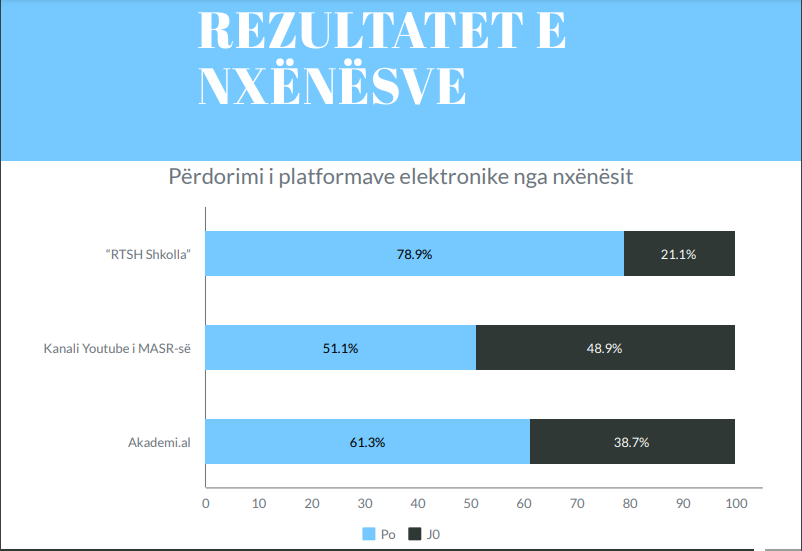
MoESY findings, student use of electronic platforms, April 2020
Despite the fact that the Ministry of Education claims that students used the electronic platform Akademia.al for their online classes, teaching was ineffective.
In August 2020, an online education survey was conducted to determine if the pre-education community was willing to begin a new school year online. However, its findings acted as a counter-indicator to the previous survey’s positive estimates on overall attendance and usage of online platforms.
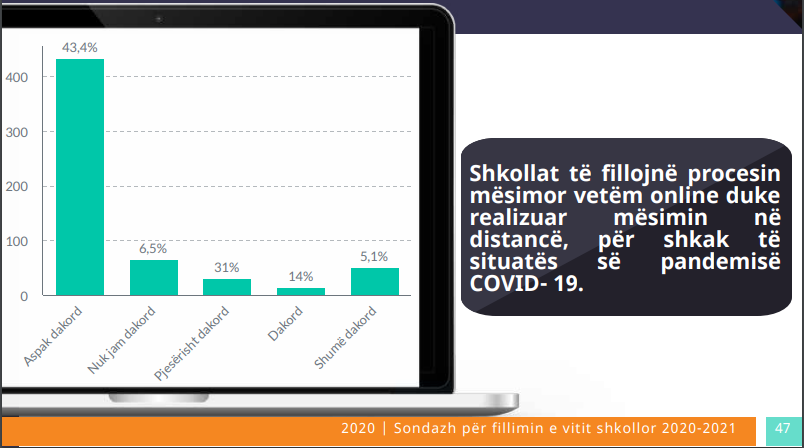
Survey findings on teachers, August 2020
“43.4 percent of teachers strongly disagreed, 6.5 percent disagreed, 31 percent partially agreed, 14 percent agreed, and 5.1 percent strongly agreed that the academic year begin online.” – the findings of the MoESY survey revealed.
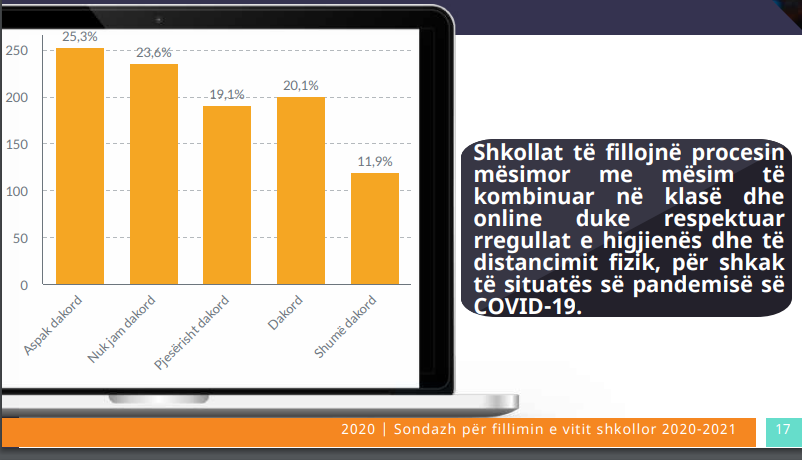
Survey findings on students, August 2020
“25.3 percent of teachers strongly disagreed, 23.6 percent disagreed, 19.1 percent partially agreed, 20.1 percent agreed, and 11.9 percent strongly agreed that the academic year include blended learning.” – the findings of the MoESY survey revealed.
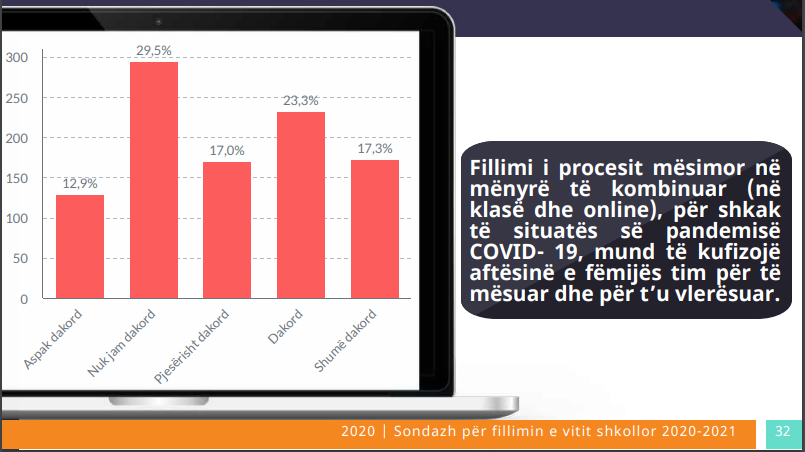
Survey findings on parents, August 2020
According to graphic data released by the ministry, 42.4 percent of parents surveyed were opposed to blended learning (12.9 percent strongly disagreed and 29.5 percent disagreed).
Blended learning was endorsed by 40.6 percent of parents (23.3 percent agreed and 17.3 percent strongly agreed). Meanwhile, 17% partially agreed.
Without taking into account the 17% that partially agreed, the third survey findings indicate that the number of people opposed to blended learning outnumbers those who support it.
There is a lack of data on the effectiveness of blended learning since September, even though the school year ends in three months.
The parents and teachers community informed Faktoje that the fourth survey took place in January 2021. Despite three months having passed, MoESY is yet to release its findings. We contacted the MoESY press office, who informed us that the survey findings would not be released, but rather used internally.
Official data are lacking, but discontent among students, parents, and teachers is not.
It’s been over a year since online education and blended learning were introduced, and stakeholders say the process has stumbled in many ways.
According to a Ministry of Education report, the majority of parents surveyed admitted to assisting their children, but they told Faktoje the opposite.
Faktoje spoke with a number of students, parents, and teachers in various parts of Albania to learn more about blended learning throughout the school year.
A.M, a student in “Ramazan Jonguzi” 9K school in Thumanë, stated:
“We have blended learning, which means we go to school one week and learn at home the next. Online education is ineffective, it’s just not working!”
L.S, a student in “Hydajet Lezha” high school in Lezhë, told Faktoje:
“We use Zoom and WhatsApp to have online classes and exchange content. Since the Ministry controls the whole process, we must still use Akademia.al. However, there are problems for we need a good internet connection in order to log in. Most of the time, we have trouble logging in. Because of the ongoing power outage, online education has proven to be ineffective. In other instances, we are unable to comprehend various subjects, such as math or physics.”
Faktoje also interviewed parents, who voiced concerns about online education and blended learning.
“My two children attend the “Nik Tom Prela” 9K school in Laç, and I am dissatisfied with their schooling, despite the fact that their teacher tries very hard to have classes with them. However, on days that they study at home, they think it is a day off. My children call me at work to ask for support with their lessons. WhatsApp is the only platform they use for online classes.” – P.A explained to Faktoje.
“I teach in one of Tiranë high schools, and I’d add that all of us, students and parents too, have faced many challenges during this period. Via online classes, students lose focus, become overwhelmed, and are unable to comprehend various subjects. Even after a year of online education, there are still issues of power outages, internet connectivity, and a shortage of electronic devices.”
According to a World Bank Report , the productivity level is expected to result in significant learning losses.
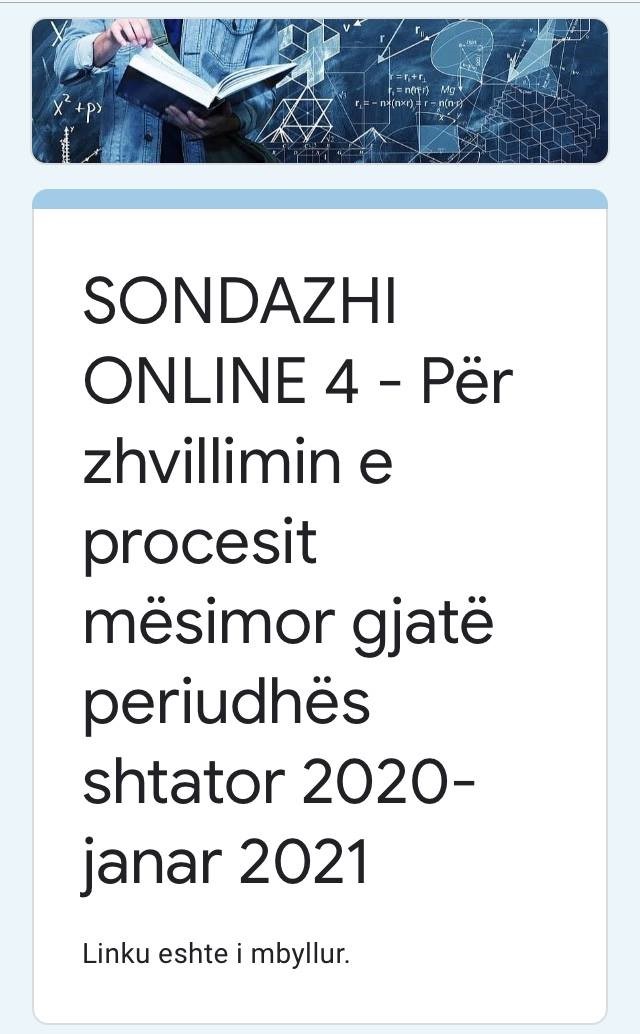
Source: Eurydice and OECD
Before the global pandemic broke out, Western Balkan education systems already faced serious challenges. Over 78 percent of 15-year-olds in Kosovo, and over 50 percent in Albania, North Macedonia, and Montenegro are functionally illiterate, according to the findings of this report. As a result, remote learning is expected to be less effective than classroom learning, particularly if used for a prolonged period of time (as happened due to the pandemic restrictions).
*Survey published by the MoESY in March 2020 – https://www.ascap.edu.al/wp-content/uploads/2020/03/Sondazhi-i-m%C3%ABsimit-online.pdf
*Survey published by the MoESY in April 2020 – https://www.ascap.edu.al/wp-content/uploads/2020/04/Sondazhi-i-m%C3%ABsimit-online-2.pdf
*Survey published by the MoESY in 2020 – 2021 https://www.ascap.edu.al/wp-content/uploads/2020/08/Sondazh.pdf
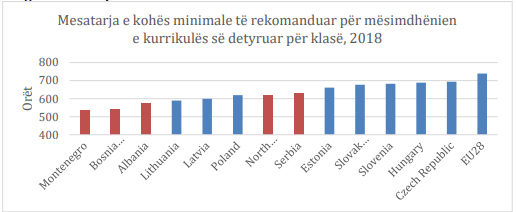
*First picture taken by Reporter.al
*The US Embassy in Albania and Partners provided financial assistance for this publication. Its content is the sole responsibility of Faktoje and it does not necessarily reflect the views of the US Embassy in Albania and Partners.





